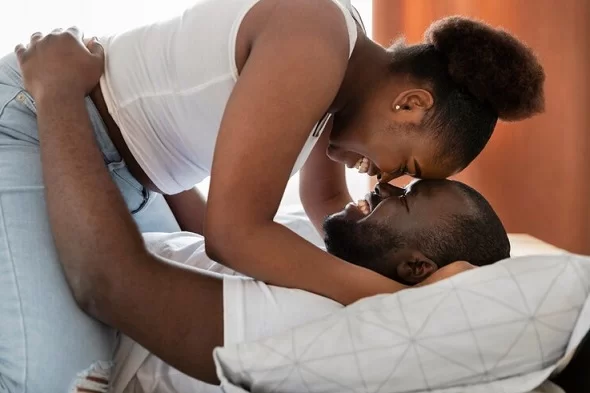
Adebayo OsunbiyihealthcareOctober 13, 2025
As a sexually active adult, you may have heard of fertile days and safe days. But are there days within your menstrual cycle that you can engage in unprotected sex without getting pregnant?
Have you ever wondered if you can get pregnant a few days after your period? Read this article to find out.

According to a study in the American Journal of Obstetricians and Gynaecologists, “there is no time in the month at which conception has not occurred in some women”.
You may think you just finished bleeding a few days ago, so you are clear and are unlikely to get pregnant, but it can still happen. It could be that there may be no mature egg released yet, and the uterus may not be ready for the implantation of a fertilized egg, but it is still possible.
How? You may ask. With every new day after your period, you get closer to your fertile days. The length of your circle, the duration of your period, when you ovulate, and how long sperm survives in your reproductive tract can make it possible for you to become pregnant shortly after your period.

If you are trying to get pregnant or avoid pregnancy, especially if you and your partner are engaging in sex without any birth control, then you need to understand your menstrual cycle. You need to know how to track your periods and your most likely fertile days (i.e., when you are ovulating).
The Menstrual cycle is the series of hormonal processes that occurs monthly in the body to prepare it for pregnancy.
Every month, hormonal changes prepare the uterus (womb) for pregnancy by causing the lining of the uterus to build up and stimulating one of the ovaries to release a mature egg (ovum).
The egg released moves through the fallopian tube to the uterus; this is called ovulation. At this stage, if there is sperm in the uterus or if the female engages in sexual intercourse, the egg may get fertilized, resulting in pregnancy.
If the egg isn’t fertilized during this stage (i.e. the ovulation stage), the egg will erupt after 24 hours. Afterwards, the lining of the uterus breaks down and bleeds out through the vagina as blood; this is known as a menstrual period. This cycle continues over and over again.
The menstrual cycle is counted from the first day of one period to the first day of the next. The length of the menstrual cycle varies from month to month and from woman to woman.
The average length of the menstrual cycle is 28 days. The length of the menstrual cycle ranges from 21 days for those with shorter cycles to 35 days for those with longer cycles.
The duration of the period also varies in individuals; it can last for 2 to 7 days, and one can lose 20 to 90 ml of blood in a period.
Menstrual periods may be painful or pain-free, light or heavy, and long or short. Your menstrual cycle might be regular or irregular.

When your ovulation approaches, you may notice some changes and signs, such as fullness and tenderness of the breast, bloating, headache, pain on one side of the pelvic area, and an increase in sex drive.
Ovulation usually occurs about 14 days before your next period, irrespective of how long or short your cycle is. So, the simplest and least expensive way to find out when you are most likely to ovulate is by tracking your periods for some months, finding the average length of your circle and subtracting 14 days.
For instance, if the average length of your cycle is 24 days long, you calculate by subtracting 14 from 24, which will give you 10 (24 – 14 = 10). This means you are likely to ovulate around day 10 of your circle.
The above method can only be used to determine when you will be ovulating if the length of your cycle is consistent and not irregular. If you experience irregular menstruation, Consult a Qualified Gynaecologist on KompleteCare.
Other ways you can tell when you are about to ovulate is by checking the texture of your cervical mucus daily. The mucus becomes more wet, clearer, slippery, and stretchy as you approach your ovulation. You can also use an ovulation home test kit or track your basal body temperature to tell when you are about to ovulate.
Although the chances are low, it is possible to conceive a few days after your period. Getting pregnant shortly after your period depends on factors such as;
Sperm can survive for 5 to 7 days in a female reproductive tract. So, one is more likely to get pregnant shortly after their period if they have a short menstrual cycle and their period lasts long for like 5 to 7 days.
Having a short cycle of, say, 21 or 22 days means your ovulation will also occur early, i.e., on day 7 or 8 of your cycle. This means if your period lasts for 3 days, you have 4 to 5 days before your next ovulation, and if you have unprotected sex during these days, the sperm can survive long enough to fertilise the egg released during your ovulation.
Moreover, if your menstrual cycle is short and your period lasts for 5 days or more, it means you can be fertile 3 days or less before ovulation, increasing your chances of getting pregnant shortly after your period.
However, the case is different for women who have a long circle of say 33 to 35 days. They are less likely to get pregnant a few days after their period because their ovulation occurs much later – on day 19 or 20 of the cycle. This means even if their period lasts for 7 days, they still have 5 to 6 days before their next fertile days.
If you have an irregular menstrual cycle, you can also get pregnant a few days after your period. This is because the irregularities of your period mean you can ovulate at any point in your circle. This includes a few days after your period. But you need the guidance of a licensed doctor to pull this off.
If you have intercourse five days before ovulation until one day after ovulation, you can become pregnant. You’re much more likely to become pregnant if there are live sperm in the fallopian tubes during ovulation.
Having your period indicates that the last egg released by your ovary was not fertilized and you are shedding the lining of the uterus, which is needed to promote the growth of the egg cells.
You are less likely to get pregnant during your period because your uterus at this moment is not ready for implantation of a fertilized egg cell. But this does not mean that it is impossible for you to conceive if you have unprotected sex during your period.
Given the fact that sperm can survive for days in the uterus, it is possible for you to get pregnant during your period if you have a short menstrual cycle paired with a long period or if you have an irregular menstrual cycle.
Stress can affect your body and health in different ways, your menstrual cycle and ovulation included. Stress, according to a study by the National Institute of Health (NIH), can affect your chance of getting pregnant after your period. And the study suggests that managing your stress may help you get pregnant.
To achieve or avoid pregnancy, you can track your ovulation to help you identify your fertile days. Some of the methods you can use to track your ovulation include:
There are no absolutely “safe” days in the menstrual cycle when you can have sex without contraception and not risk becoming pregnant. So, regardless of what day it is in your cycle, be it during your period or a few days after, it is still possible for you to get pregnant.
So if you are trying to avoid pregnancy it’s always best to use condoms and/or other forms of birth control like the pill, IUD, or litigation to prevent pregnancy. And if you intend to use the natural birth control method, then you need to understand your menstrual cycle and your doctor can also help you to figure out days when you are less likely to get pregnant.
But, if you are trying to conceive, it is best to be intimate on your fertile days. This can increase your chances of getting pregnant. If you are unable to conceive after some months of trying, then it is advisable for you to speak to a qualified doctor.
References
healthcareOctober 17, 2025
healthcareSeptember 10, 2025
healthcareAugust 20, 2025
NutritionSeptember 16, 2025
healthcareOctober 17, 2025
NutritionFebruary 5, 2025
MedicationFebruary 5, 2025
healthcareFebruary 27, 2025








